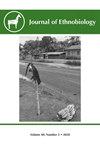Ethnobiology Phase VI: Decolonizing Institutions, Projects, and Scholarship
IF 1.3
3区 社会学
Q1 ANTHROPOLOGY
引用次数: 28
Abstract
Abstract. Ethnobiology, like many fields, was shaped by early Western imperial efforts to colonize people and lands around the world and extract natural resources. Those legacies and practices persist today and continue to influence the institutions ethnobiologists are a part of, how they carry out research, and their personal beliefs and actions. Various authors have previously outlined five overlapping “phases” of ethnobiology. Here, we argue that ethnobiology should move toward a sixth phase in which scholars and practitioners must actively challenge colonialism, racism, and oppressive structures embedded within their institutions, projects, and themselves. As an international group of ethnobiologists and scholars from allied fields, we identified key topics and priorities at three levels: at the institutional scale, we argue for repatriation/rematriation of biocultural heritage, accessibility of published work, and realignment of priorities to support community-driven research. At the level of projects, we emphasize the need for mutual dialogue, reciprocity, community research self-sufficiency, and research questions that support sovereignty of Indigenous Peoples and Local Communities over lands and waters. Finally, for individual scholars, we support self-reflection on language use, co-authorship, and implicit bias. We advocate for concrete actions at each of these levels to move the field further toward social justice, antiracism, and decolonization.民族生物学第六阶段:非殖民化机构、项目和奖学金
摘要与许多领域一样,民族生物学是由早期西方帝国在世界各地殖民人民和土地并开采自然资源的努力形成的。这些遗产和实践今天依然存在,并继续影响着民族生物学家所属的机构、他们如何进行研究以及他们的个人信仰和行动。不同的作者之前已经概述了民族生物学的五个重叠的“阶段”。在这里,我们认为民族生物学应该进入第六阶段,在这一阶段,学者和从业者必须积极挑战殖民主义、种族主义和嵌入其机构、项目和自身的压迫性结构。作为一个由来自相关领域的民族生物学家和学者组成的国际团体,我们在三个层面上确定了关键主题和优先事项:在机构层面,我们主张遣返/重新遣返生物文化遗产,可获得已发表的作品,以及调整优先事项以支持社区驱动的研究。在项目层面,我们强调需要相互对话、互惠、社区研究自给自足,以及支持土著人民和地方社区对土地和水域主权的研究问题。最后,对于个别学者,我们支持对语言使用、合著和隐性偏见的自我反思。我们主张在每一个层面采取具体行动,使该领域进一步走向社会正义、反种族主义和非殖民化。
本文章由计算机程序翻译,如有差异,请以英文原文为准。
求助全文
约1分钟内获得全文
求助全文
来源期刊

Journal of Ethnobiology
Social Sciences-Anthropology
CiteScore
4.80
自引率
3.40%
发文量
21
审稿时长
>12 weeks
期刊介绍:
JoE’s readership is as wide and diverse as ethnobiology itself, with readers spanning from both the natural and social sciences. Not surprisingly, a glance at the papers published in the Journal reveals the depth and breadth of topics, extending from studies in archaeology and the origins of agriculture, to folk classification systems, to food composition, plants, birds, mammals, fungi and everything in between.
Research areas published in JoE include but are not limited to neo- and paleo-ethnobiology, zooarchaeology, ethnobotany, ethnozoology, ethnopharmacology, ethnoecology, linguistic ethnobiology, human paleoecology, and many other related fields of study within anthropology and biology, such as taxonomy, conservation biology, ethnography, political ecology, and cognitive and cultural anthropology.
JoE does not limit itself to a single perspective, approach or discipline, but seeks to represent the full spectrum and wide diversity of the field of ethnobiology, including cognitive, symbolic, linguistic, ecological, and economic aspects of human interactions with our living world. Articles that significantly advance ethnobiological theory and/or methodology are particularly welcome, as well as studies bridging across disciplines and knowledge systems. JoE does not publish uncontextualized data such as species lists; appropriate submissions must elaborate on the ethnobiological context of findings.
 求助内容:
求助内容: 应助结果提醒方式:
应助结果提醒方式:


